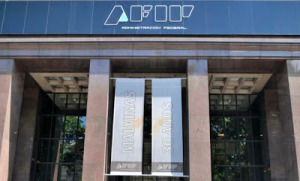
Photo © Wayne Bernhardson.
Many times recently I’ve touched on the topic of exchange rates and, in that regard, I have to say that it’s so much easier to write on Chile or Uruguay, whose juridical and macroeconomic stability make it relatively simple to inform potential visitors of what they’ll encounter. Argentina, though, is a challenge, and there’s always the risk that details may change between the moment I finish writing and the time I post it.Still, it would be negligent of me to ignore Argentina’s 20 percent surcharge on foreign travel – including airline tickets and tour packages – that the AFIP tax agency decreed that even non-resident foreigners will now have to pay. That’s not quite so alarming as it might sound at first: if you’ve purchased your plane ticket and other services before leaving home, it will not affect your travel within or beyond Argentine borders. If, however, you purchase a flight or other service that takes you beyond Argentina – say, for instance, the Buquebus ferry to Colonia or Montevideo – the Argentine provider will charge you that additional 20 percent. Cross-border bus trips, to Brazil or Chile for instance, will be at least 20 percent dearer than those to Argentine border towns.
That’s significant because, even if you have changed your foreign currency on the so-called “blue” market, where the dollar rate skyrocketed above eight pesos this week, the ticket will cost you 20 percent more than the official rate of five-pesos-plus. That’s still a pretty good deal, as the breach between the official and informal exchange markets approaches 70 percent, but it’s obviously not so good as it was before. It’s a really bad deal if you’re using a credit or debit card, as you’ll be paying the official rate.
In theory, AFIP will reimburse you for the hassle. When Argentines fill out their annual tax returns, the 20 percent surcharge will supposedly be deducted from any balance due and, if there has been an overpayment, they will get refunds. The same applies, in principle, to non-resident foreigners, with AFIP stating that they will be reimbursed for the full 20 percent. To me, that falls into the “I’ll believe when I see it category,” and I would also be reluctant to provide the personal information – my US Social Security number – that AFIP is asking for.
That’s the scenario at present but, as matters advance, I will do my best to keep readers informed about a country that continues to make things up as it goes along.
Early next month – April 9 at 7:30 p.m., to be precise – I will offer a digital slide presentation on Chile in the Los Altos Library (13
S. San Antonio Road, Los Altos 94024, tel. 650/948-7683). Coverage will also include the Chilean Pacific Islands of Rapa Nui (Easter Island and Juan Fernández (Robinson Crusoe), as well as southernmost Argentina (Tierra del Fuego and the vicinity of El Calafate) that appear in the book. I will also be available to answer questions about Argentina and Buenos Aires. The presentation is free of charge, but books will be available for purchase.